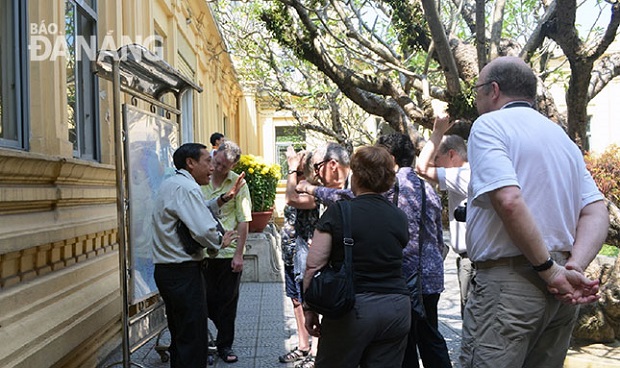Severe shortage of tour guides speaking unpopular foreign languages
Currently, after Ho Chi Minh City and Ha Noi, Da Nang ranks 3rd in terms of the number of tour guides with 2,598. 1,551 of them have granted international tourist guide cards by the municipal Department of Tourism. This figure only satisfies the demand for tour guides for visitors from English, French and Japanese-speaking countries. However, Da Nang is now facing a sharp shortage of tour guides able to communicate in such unpopular foreign languages as Korean, Russian, German, Italian, Spanish, Thai, Lao and Bahasa Indonesia.
 |
| A tour guide speaks to foreign visitors at the city’s Cham Museum of Sculpture |
According to latest statistics from the municipal Department of Tourism, Da Nang usually welcomes between 35,000 and 37,000 South Korean each month. It is estimated that the city is in need of about 311 tour guides who can speak Korean fluently to satisfy such a large mummer of visitors from this key foreign tourist market, but there are only 30 licenced tour guides. To solve this problem, those who once lived and studied in South Korea are now being temporarily recruited by local travel agencies to offer guidance to their customers.
Recent years have also seen a growing number of visitors arriving in Da Nang from Spain, especially in August every year. There are currently over 200 tour guides nationwide for Spanish visitors, but the majority of them are now working in Ho Chi Minh City and Ha Noi.
So far, universities in central region have yet to open the faculties of Bahasa Indonesia, Lao, German, Italian and Spanish. Therefore, supplies of tour guides speaking these unpopular foreign languages fall short in the city. In particular, the city is expected to face a dearth of young German-speaking tour guides in the future years to replace the existing senior ones.
In reality, some local tour guides have yet to improve their professional skills, especially their poor insight into cultural and historical features of local attractions to introduce them to their customers.
The Chairman of the municipal Travel Association, Mr Cao Tri Dung, recently highlighted the significance of intensive and long-term training courses in improving the quality of local tour guides. He also proposed that local travel agencies should focus on recruiting those who possess outstanding qualifications and good work ethics.
Many local tour guides seem to prefer to design and operate their own tours for domestic and foreign visitors rather than work permanently for a certain travel agency. Therefore, relevant local agencies are now facing some difficulties in tightening their management of these tour guides. To resolve this highly concerning matter, Chairman Dung suggested that freelance guides should be encouraged to become a contracted employee for local travel agencies. These businesses should regularly offer training courses for their employees, as well as made proposals to relevant agencies about revoking tourist guide cards of those who violate the country’s tourism regulations.